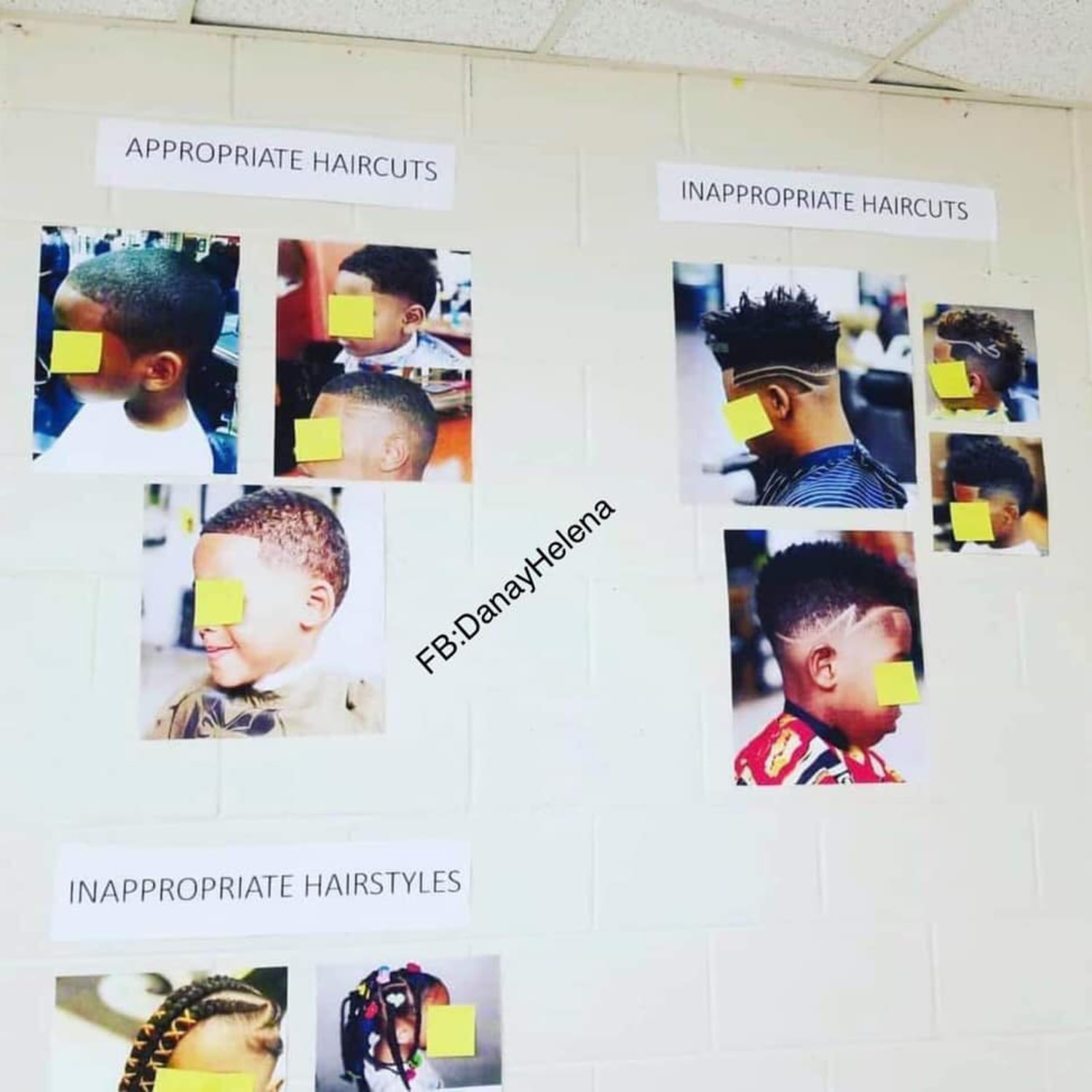The cultural identity of Black Americans has been under attack for centuries. Historically Black hairstyles serve to protect natural hair as well as signify cultural membership and express personal style. Many of these hairstyles, however have been restricted in workplace and school settings, cited as being unprofessional, uncleam, and inappropriate. This wrongful view of Black hair stems from centuries of forced submission, as attempts are made to erase the culture of Black Americans. What should be seen as the celebration and preservation of commonly disrupted cultural practices has been the topic of much controversy. The following link details a story about a preschool aged boy who was told violated the dress code for wearing his hair in braids. In communities of color disproportionately faced with economic and societal hardships, hairstyles should not be the hindrance to academic and career success.
Stories like these are not few and far between. In another similar case, a Georgia school displayed posters of Black hairstyles, one labeled inappropriate haircuts and the other labelled appropriate haircuts. Kids should not face confusion in expressing their identities, or be forced to diminish their representation of their heritage.

Limitations on black hair spans back to the Atlantic slave trade, when slave masters would shave slaves’ heads to remove them from their culture, as hairstyles were often used to signify tribe identity and personal status. When African American slaves were granted some freedom, they were still expected to assimilate into white culture and be obedient to the white superiors, persisting into current decades.
https://www.essence.com/videos/the-overexplainer-we-are-only-just-now-stopping-black-hair-discrimination/
The video in the link above is a deep dive into the long history of black hair discrimination as well as the beginnings of laws that will work to protect the rights of Black people in schools and workplaces. With laws like these Black people will have the choice to wear their hair in its natural state, rather than be forced into believing that the only acceptable hairstyles are the ones that require excessive heat and harsh chemicals.
The 2019 short film Hair Love, celebrates Black hair. Dove, a brand that has done significant work to celebrate all bodies was a major contributor to the film’s creation. This shows that mainstream brands are working to promote Black self love and abolish hair discrimination. With mainstream support and anti-discriminatory laws, workplaces and schools will become more inclusive, slowly reversing centuries of injustice.
Wow, what a great example of systemic injustice. I never realized that there were ever rules against certain hairstyles. I can not imagine how a hairstyle could ever be inappropriate, that is so unfair and I feel that it’s a topic that is not brought to light as much. It is so sad that this injustice has continued on for so long. After watching the video you shared, I definitely shed a tear or two. It was so impactful and so heartwarming. Thank you for sharing!
This is such a ridiculous rule and completely shows the racism or even implicit bias that people are thinking and teaching. No matter how you look at this, these children aren’t taught growing up these hairstyles have a race or meaning….it’s hair. I think banning things like this from a culture approach shouldn’t be allowed and it denies one their culture.
It is really saddening when African Americans are being forced to have certain hairstyles which are considered “professional”. Culture is not something that should be stripped like that. It is certainly unbelievable especially for the kids at a young age to be discriminated against when they are in their developing years of finding their own identity.
It is such a shame that people choose to belittle people over their hairstyles, when they could be using that energy to do some good in the world. This has caused many problems I would imagine for African Americans, having to worry about what other people may think of your hair and how that might impact whether or not they can get a job to support themselves and their family.
It is horrible that young kids are going through this in a school system that is supposed to educate them. For these young African America kids, their hairstyles is a part of their history. I don’t see how there is any bit of “professional” difference in those hairstyles. In the workplace and in school, they are being stripped of their personality for something as trivial as a hair style. Thank you so much for sharing and bringing attention to this!
I didn’t know that there are rules against certain hairstyles. That’s a good example of injustices. It actually shows the racism and I cannot imagine how it feels like to worry about what other people may think of your hair.
This is an excellent post because I did a systematic injustice paper very similar to this and it involved black women and their hair styles being banned in the work place. An legal document called the CROWN Act was made to protect women with natural hair styles and also to protect employees from racial discrimination. I’m that you brought this to class attention so people can see how people of color are racially discriminated against in an everyday society.
this is a great example of injustice and also a very upsetting one to read about because it. is so morally wrong. This is a ban on a hairstyle which is really a ban on self- expression, creativity and individuality. This injustice is an issue that needs to be resolved so people can express themselves in a way that makes them happy.